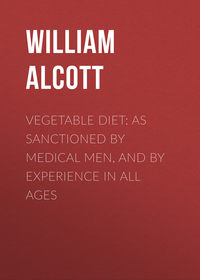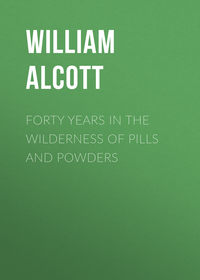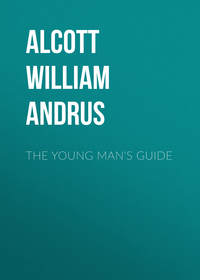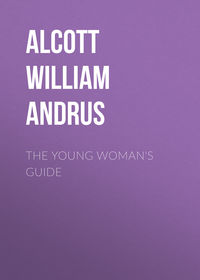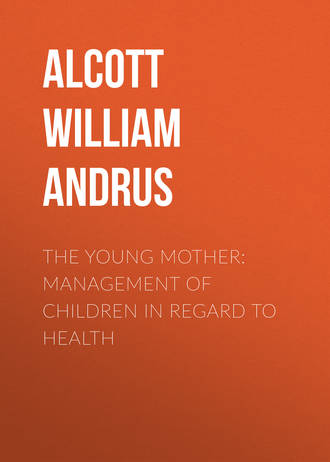
The Young Mother: Management of Children in Regard to Health
But as I am writing, not for persons under immediate excitement, but for those that may be reasoned with, it is proper to say, that in medicine, the warm bath is so often used in extreme cases, and as a last resort, even when death has already grasped, or is about to fix his grasp on the sufferer, that it would be very strange if many persons did not die, just after bathing. But that the bathing itself ever produced this result, in one case in a thousand, there is not the slightest reason for believing.5
There are many more whims connected with bathing, as with almost everything else, which it were equally desirable to remove. Some nurses and mothers think that if the child's skin is wiped dry after bathing, it will impair, if not destroy, the good effects of the operation. Others still, shocking to relate, will even put it to bed in its wet clothes; this, too, from principle. Not unlike this, is the belief, very common among adults, that if we get our clothes wet—even our stockings—we must, by all means, suffer them to dry on us; a belief which, in its results, has sent thousands to a premature grave—and, what is still worse, made invalids, for life, of a still greater number.
I am aware, that in rejecting the indiscriminate cold bathing of infants, I am treading on ground which is rather unpopular, even with medical men; a large proportion of whom seem to believe that the practice may be useful. But I am not wholly alone. Dr. Dewees—of whose large experience I have already spoken—and some others, do not hesitate to avow similar sentiments.
The objections of Dr. Dewees to cold bathing are the following. 1. There often exists a predisposition to disease, which cold bathing is sure to rouse to action. Or if the disease have already begun to affect the system, the bath is sure to aggravate it. 2. Some children have such feeble constitutions that they are sure to be permanently weakened by it, rather than invigorated. 3. To those in whom there is the tendency of a large quantity of blood to the head, lungs, liver, &c., it is injurious. 4. In some, the shock produces a species of syncope, or catalepsy. 5. The reaction, as shown by the heat which follows the cold bath, is, in some cases, so great as to produce a degree of fever, and consequent debility. 6. It never answers the purposes of cleanliness—one great object of bathing—so well as the warm bath. 7. It is always unpleasant or painful to the child; especially at first. 8. It sometimes produces severe pain in the bowels.
This is a very formidable list of objections; and certainly deserves consideration. There is one statement made by Dr. D. in the progress of his remarks on this subject, in which I do not concur. He says—"The object of all bathing is to remove impurities arising from dust, perspiration, &c., from the surface; that the skin may not be obstructed in the performance of its proper offices."
But the object of cold bathing, with many, is to harden; consequently it is not true that cleanliness is the only object. If he means, even, that cleanliness is the only legitimate object of all bathing, I shall still be compelled to dissent.
If the cold bath could be used, always, by and with the direction of a skilful physician, I believe its occasional use might be rendered salutary. And although as it is now commonly used, I believe its effects are almost anything but salutary, I do not deny that if its use were cautiously and gradually begun, and judiciously conducted, it might be the means of making children who are already robust, still more hardy and healthy than before, and better able to resist those sudden changes of temperature so common in our climate, and so apt to produce cold, fever, and consumption.
Cold bathing, in the hands of those who are ignorant of the laws of the human frame—and such unfortunately and unaccountably most fathers and mothers are—I cannot help regarding as a highly dangerous weapon; and therefore it is, that in view of the whole subject, I cannot recommend its general and indiscriminate use.
If there are individuals, however, who are determined to employ it, in the case of their more vigorous children, and without the advice or direction of their family physician, I beg them to attend to the following rules or principles, expressed as briefly as possible.
In no ordinary case whatever, is the cold bath useful, unless it is succeeded by that degree of warmth on the surface of the body which is usually called a glow. This is a leading and important principle. The contrary, that is, the injurious effects of cold bathing—its immediate bad effects, I mean—are shown by the skin remaining pale and shrivelled after coming out of the bath, by its blue appearance, and by its coldness, as well as by a sunken state of the eyes, and much general languor.
To secure this point—I mean the GLOW—it is indispensably important to begin the use of cold water gradually; that is, to use it at first of so high a temperature as to produce only a slight sensation of cold, and to take special care that the skin be immediately wiped very dry, and the temperature of the room be quite as high as usual. Afterward the water may be cooled gradually, from week to week, though never more than a degree or two at once.
It will probably be unsafe to commence this practice of cold bathing—even in the case of the most robust children—until they are at least six months of age.
The appropriate season will be the middle of the forenoon, the hour when the system is usually the most vigorous, and at which we shall be most likely to secure a reaction. At first, twice or three times a week are as often as it will be safe to repeat it. Some writers recommend it twice a day; but once is enough, under any ordinary circumstances.
The method at first is, to give the infant a single plunge. Afterward, when he becomes older, and more inured to it, he may be plunged several times in succession.
On taking him out of the bath, the skin should be wiped perfectly dry, as in the case of the warm bath, and with the same or an increased degree of attention to other circumstances—the temperature of the room, the avoiding currents of air, &c. He should next be put in a soft, warm blanket, and be kept for some time in a state of gentle motion; and after a little time, should be dressed.
I have already mentioned the importance of avoiding the manifestation of fear, when we bathe a child; and the caution is particularly necessary in the administration of the cold bath. Some writers even recommend, that during the whole process of undressing, bathing, exercising, and dressing, singing should be employed. There is philosophy in this advice, and it is easily tried; but I cannot speak of it from experience.
There is one thing which may serve to calm our apprehensions—if we have any—of danger; which is, that though the child's lungs are feeble at first, from their not having been, like the heart, accustomed to previous action, yet when they get fairly into motion and action, and the child is a few months old, they are probably as strong, if not stronger, in proportion, than those of adults.
Bathing in cold water should never be performed immediately after a full meal. Neither is it desirable to go to the contrary extreme, and bathe when the stomach has been long empty; nor when the child's mental or bodily powers are more than usually exhausted by fatigue.
Although I have given these rules for those who are determined to use the cold bath with their children, yet, for fear I shall be misunderstood, I must be suffered to repeat, in this place, that, uninformed as people generally are in regard to physiology, I cannot advise even its moderate use. On the contrary, I would gladly dissuade from it, as most likely, in the way it would inevitably be used, to do more harm than good.
There is no sort of objection to what might be called local bathing with cold water. If the child's head is hot at any time, the temples, and indeed the whole upper part of the head, may be very properly wet with moderately cold water—taking care to avoid wetting the clothes. But avoid, by all means, the common but foolish practice of putting spirits in the water.
A tea-spoonful of cold water cannot be too early put into the mouth of the infant. The object is to cleanse or rinse the mouth; and the process may be aided by wiping it out with a piece of soft linen rag. If a part or all of the water should be swallowed, no harm will be done. This practice, commenced almost as soon as children are born, has saved many a sore mouth.
There are other forms of bathing besides those already mentioned; among which are the shower bath, the vapor bath, and the medicated bath. The shower bath—for which purpose the water is commonly used cold—is but poorly adapted to the wants of infants. The shock is much greater than the common cold bath, and more apt to frighten; and fear is unfavorable to reaction, or the production of a genial glow.
The vapor bath is much better; and probably has quite as good an effect as the common warm bath. The trouble and expense of procuring the necessary apparatus is somewhat greater, however, as a mere bathing tub costs but little, and can be made by every father who possesses common ingenuity. But whatever may be the expense, it is indispensable in every family; and whenever the pores of the skin are obstructed, a vapor bathing apparatus is equally desirable.
The medicated vapor bath is sometimes used; but I am not now treating of infants who are sick, but of those who are in a state of health.
The common warm bath is sometimes medicated by putting in salt. This, of course, renders the water more stimulating to the skin; but except when the perspiration is checked, or the skin peculiarly inactive from some other cause—in other words, unless we are sick—it is seldom expedient to use it.
There is one substitute for the bathing tub, in the case of the cold bath. I refer to the use of a wet cloth or sponge, applied rapidly to the whole surface of the body. When this is done, the skin should be wiped thoroughly dry immediately afterwards, as in the case of complete immersion.
The application of either a cloth or a sponge, filled with warm water, to the skin, in this manner, even if continued for several minutes together, is less efficacious than a continuous immersion. I repeat it—no family ought to be without conveniences for bathing in warm water daily. I speak now of every member of the family, young and old, as well as the infant; and I refer particularly to the summer season: though I do not think the practice ought to be wholly discontinued during the winter.
It will still be objected that this care of, and attention to the young, in reference to health—this provision for bathing daily, and care to see that it is performed—can never be afforded by the laboring portion of the community. But I shall as strenuously insist on the contrary; and trust I shall, in the sequel, produce reasons which will be satisfactory.
The great difficulty is, to convince parents that these things are vastly more productive of health and happiness to their children—more truly necessaries—than a great many things for which they now expend their time and money. There is, and always has been—except, perhaps, among the Jews, in the earliest periods of the history of that wonderful nation—a strange disposition to overlook the happiness of the young. It is not necessary to represent this dereliction as peculiar to modern times, for we find traces of the same thing thousands of years ago.
The Roman emperors—Dioclesian in particular—could make provision for bathing, to an extent which now astonishes us; but for whom? For whom, I repeat it, was incurred the enormous expense of fitting up and keeping in repair accommodations for bathing at once 18,000 people? For adults; and for adults alone. I do not say that children were not admitted, in any case; but I say they were not contemplated in these arrangements. Nothing was done—not a single thing—that would not have been done, had there been no child under ten years of age in the whole empire.
And what better than this do WE, now? We make provision for the happiness of the adult. The most indigent person will find time and money to spend for the gratification of his own senses, his pride, or his curiosity; but his children—they may be overlooked! Or, if he has an eye to the future happiness of his child, he conceives that he is promoting it in the best possible degree, by endeavoring to lay up a few dollars for his use, after his character is formed—at a period, as it too often happens, when money will do him little good, since it can neither purchase health, peace of mind, nor reputation.
Far be it from me to say, that the poor—ground into the dust as they are, by the force of circumstances operating with their own concurrence, to make them ignorant, vicious, or miserable—can do for their children all that is desirable. By no means. But they have it in their power to do much more than they are at present doing. They have it in their power, at least, to use the same good sense in the management of the human being that they do in that of a pig, a calf, or a colt, or even a young vegetable. No parent, let him be ever so poor, is found in the habit of neglecting either of these in proportion to its infancy, and of exerting himself only in proportion as it grows older. Common sense tells him that the contrary is the true course; that however poor he may be, he will be still poorer, if he do not take special pains with the young animal, to rear it and with the young vegetable, to give it the right direction, by keeping down the weeds, and pruning and watering it. And I say again, that however deserving of censure the wealthy of a Christian community may be in not directing the ignorant and vicious into the right path, and in not expending more of their wealth on those who are poor, in elevating their minds and their manners, and promoting their health, still the latter are inexcusable for their present neglect of their infant offspring, while they would not think of neglecting, on the same principle, the offspring of their domestic animals.
CHAPTER VII.
FOOD
SEC. 1. General principles.—SEC. 2. Conduct of the mother.—SEC. 3. Nursing—rules in regard to it.—SEC. 4. Quantity of food. Errors. Over-feeding. Gluttony.—SEC. 5. How long should milk be the child's only food?—SEC. 6 Feeding before teething. Cow's milk. Sucking bottles. Cleanliness. Nurses.—SEC. 7. Treatment from teething to weaning.—SEC. 8. Process of weaning-rules in regard to it.—SEC. 9. First food to be used after weaning. Importance of good bread. Other kinds of food.—SEC. 10. Remarks on fruit.—SEC. 11. Evils and dangers of confectionary.—SEC. 12. Mischiefs of pastry.—SEC. 13. Crude and raw substances.
SEC. 1. General PrinciplesThe mother's milk, in suitable quantity, and under suitable regulations, is so obviously the appropriate food of an infant during the first months of its existence, that it seems almost unnecessary to repeat the fact. And yet the violations of this rule are so numerous and constant, as to require a few passing remarks.
There are some mothers who seem to have a perfect hatred of children; and if they can find any plausible apology for neglecting to nurse them, they will. Few, indeed, will publicly acknowledge a state of feeling so unnatural; but there are some even of such. On the latter, all argument would, I fear, be utterly lost. Of the former, there may, be hope.
They tell us—and they are often sustained by those around them—that it is very inconvenient to be so confined to a child that they cannot leave home for a little while. Can it be their duty—for in these days, when virtue and religion, and everything good, are so highly complimented, no people are more ready to talk of duty than they who have the least regard to it—can it be their duty, they ask, to exclude themselves from the pleasures and comforts of social life for half or two thirds of their most active and happy years? Ought they not to go abroad, at least occasionally? But if so, and their children have no other source of dependence, must they not suffer? Is it not better, therefore, that they should be early accustomed to other food, for a part of the time? Besides, they may be sick; and then the child must rely on others; and will it not be useful to accustom it early to do so?
Perhaps few mothers are conscious that this train of reasoning passes through their minds. But that something like it is often made the occasion of substituting food which is less proper, for that furnished by Divine Providence, there cannot be a doubt. And the mischief is, that she who has gone so far, will not scruple, ere long, to go farther. And, strange and unnatural as it may seem, that mothers should turn over their children to be nursed wholly by others, in order to get rid of the inconvenience of nursing them at their own bosoms, it is only carrying out to its fullest extent, and reducing to practice, the train of reasoning mentioned above.
Nor is it necessary that I should stop here to denounce a course of conduct so unchristian and savage. I know it is very common in some countries; and those American mothers who ape the other eastern fashions, or countenance their sons and daughters in doing it, will not be slow to imitate this also—especially as it is a very convenient fashion. And I question whether I shall succeed in reasoning them out of it. Habit, both of thought and action, is exceedingly powerful. I will, therefore, confine myself chiefly to those efforts at prevention, from which much more is to be hoped, in the present state of society, than from direct attempts at cure.
It will be soon enough to leave a child with another person, when the mother is actually sick, or unavoidably absent; or when some other adequate cause is known to exist. We are to be governed, in these and similar cases, by general rules, and not by exceptions. The general rule, in the present case, is, that mothers can nurse their own children; and, if they have the proper disposition, that they can do it uninterruptedly.
But those who are so ready to become counsellors on these occasions, will tell us, perhaps, that the child must be "fed to spare the mother." That is to say, nursing weakens the mother, and the child must be taken away, a part of the time, to save her strength.
Now it may safely be doubted whether the process of nursing, in itself considered, does weaken, at all. The Author of nature has made provision for the secretion (formation) of the milk, whether the child receives it or not. If it is not taken by the child, or drawn off in some other way, one of two things must follow;—either it must be taken up by what are called absorbent vessels, and carried into the circulation, and chiefly thrown out of the system as waste matter, or it will prove a source of irritation, if not of inflammation, to the organs themselves which secrete it. In both cases, the strength of the mother is quite as likely to be taxed, as if the child received the milk in the way that nature intended.
Besides, on this very principle, the plan of saving a mother's strength by requiring another to nurse for her, is but saying that we will weaken one person to save another. Or if we feed the child, to "spare its mother," what is this, in practice, but to say that the works of the Creator are very imperfect; and that he has thrown upon the mass of mankind a task to which they are not equal? For the mass of mankind are poor; and the poor, having neither the means nor the time to escape the duties in question, must submit to them, while their more wealthy neighbors escape.
But it is idle to defend customs so monstrous. They admit of no defence that has the slightest claim to solidity. The general rule then is, that mothers should nurse their own children.
SEC. 2. Conduct of the MotherOriginally it was not my intention to give directions, in this volume, in regard to the food, drink, &c., of the mother while nursing; but repeated solicitations on this point, have led me to the conclusion that a few general principles may be very properly introduced.
The future health, and even the moral well-being of the child, depend much more on the proper management of the mother herself than is usually supposed. How, indeed, can it be other wise? How can the mother's blood be constantly irritated with improper food and drink, without rendering the milk so? And how can a child draw, daily and hourly, from this feverish fountain, without being affected, not only in his physical frame, but in his very temper and feelings?
It is not enough that we adopt the principles already insisted on by some of our wisest medical men, and even by one or two medical societies,6 that children in this way often acquire a propensity for exciting drinks, that may end in their downright intemperance. What if it should not, in every case, proceed quite so far as to make the child a drunkard? If it but lays the foundation of a constitutional fondness for excitements, it tends to disease. Indeed that, in itself, is a disease; and one, too, which is destroying more persons every year than the cholera, or even the consumption. Consumption has at most only slain her tens of thousands7 a year; but a fondness for exciting food and drink—innocent and harmless as it is often supposed to be, and therefore only the more dangerous a foe—does not fail to slay every year, directly or indirectly, its hundreds of thousands. At least this is my own opinion.
Why, where can you find the individual who is not a slave to this perpetual rage within—this perpetual cry, "Who will show us any" physical "good"? Who, in this land of abundance, will eat or drink plain things? Who will eat simple bread, meat, potatoes, rice, pudding, apples, &c. or drink simple water? A few instances may be found, of late, in which people confine themselves to simple water for drink; but they are rather rare. And no wonder. They must be rare so long as an unnatural thirst is kept up everywhere by the most exciting and most strange mixtures of food. Where, I again ask, is the person who will eat and relish plain bread, plain meat, plain puddings, &c.? Certainly not in the nursery. No young mother—scarcely one I mean—will, for a single meal, confine herself to a piece of bread, the sweetest and best food in the whole world, unless it is hot, or toasted, or soaked, or buttered. A natural, healthy appetite, is as rare a thing on our planet, almost, as an inhabitant of the sun or moon.
I have seen more than one mother made sick by using, while nursing, improper food and drink. I have known milk punch, taken by stealth—(because how could the mother, it was said, ever have a supply of food for her poor child without it!)—to kindle a fever that came very near burning up the mother and child both. And yet, if I have once or twice succeeded in convincing the mother that she was only suffering the natural punishment of her own transgressions, I have never, so far as I now recollect, succeeded in making her believe that her iniquities were visited upon her unoffending infant.
There is everywhere the most painful apathy on this most painful subject. We see little children of all ages, everywhere, the victims of debility, and pain, and suffering, and disease and death, and yet we very seldom seem to search for one moment for the causes of this premature destruction. In fact most parents—even many intelligent mothers—at once stare, if you attempt to inquire into the causes of their child's death, as if it was either a kind of sacrilege, or an impeachment of their own parental affection. Diseases, even at this day, with the sun of science blazing in meridian splendor, they seem to regard as the judgments of heaven; and to think of tracing out the causes of the early death of half our race, is, in their estimation, not only idle, but wicked.
Yet this is obviously one of the first steps, every, where, which philanthropy demands; to say nothing of the demands of christianity. It is the first step for the physician, the first step for the educator, the first step for the parent, and above all, the mother. Nay; more—we must not suppress so great and important a truth—it is the first step for the legislator and the minister. What sense is there in continuing, century after century, and age after age, to expend all our efforts in merely mending the diseased half of mankind, when those same efforts are amply sufficient, if early and properly applied, not only to continue the lives of the whole, but to make them whole beings, instead of passing through life mere fragments of humanity?


